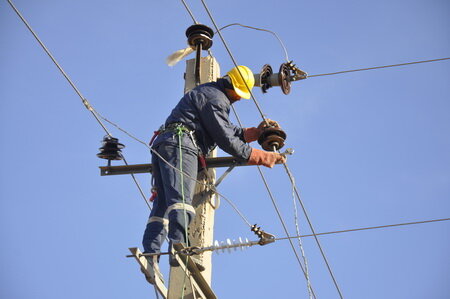
Nearly $1.2b needed to reduce losses in power grid: Energy Ministry

According to the Energy Ministry, this amount of investment is economical and justifiable given the fact that this cost is much lower than the costs for power plant construction and it will also lead to lower fuel consumption.
As reported, since the Iranian calendar year of 1392 (started on March 21, 2013) up to the end of the calendar year of 1397 (ended on March 20, 2019) the losses in the Iranian electricity network has been reduced by 4.1 percent.
During the mentioned time span, electricity losses fell from 15.2 percent to 11.1 percent.
A four-percent reduction in losses means saving the costs for construction of 2500 megawatts capacity of new power plants (about €5.1 billion) and a reduction of eight billion cubic meters of natural gas consumption (equivalent to annual production of one of the South Pars gas field’s phases).
According to the data released by the Energy Ministry, Iran's electricity grid losses were less than those of Mexico, Turkey, and Brazil in the Iranian calendar year of 1397.
With a nominal electricity generation capacity of 84,795 megawatts [84.795 gigawatts (GW)], Iran has one of the biggest power networks in the Middle East.
The country’s total power generation capacity stood at 80,000 MW in the Iranian calendar year of 1397, up from the 78,484 MW of its preceding year.


Gold price edges up as market awaits Fed minutes, Powell speech

Glencore trader who led ill-fated battery recycling push to exit

Emirates Global Aluminium unit to exit Guinea after mine seized

UBS lifts 2026 gold forecasts on US macro risks

Iron ore price dips on China blast furnace cuts, US trade restrictions

Roshel, Swebor partner to produce ballistic-grade steel in Canada

EverMetal launches US-based critical metals recycling platform

US hikes steel, aluminum tariffs on imported wind turbines, cranes, railcars

Afghanistan says China seeks its participation in Belt and Road Initiative

First Quantum drops plan to sell stakes in Zambia copper mines

Ivanhoe advances Kamoa dewatering plan, plans forecasts

Texas factory gives Chinese copper firm an edge in tariff war

Pan American locks in $2.1B takeover of MAG Silver

Iron ore prices hit one-week high after fatal incident halts Rio Tinto’s Simandou project

US adds copper, potash, silicon in critical minerals list shake-up

Barrick’s Reko Diq in line for $410M ADB backing

Gold price gains 1% as Powell gives dovish signal

Electra converts debt, launches $30M raise to jumpstart stalled cobalt refinery

Gold boom drives rising costs for Aussie producers

First Quantum drops plan to sell stakes in Zambia copper mines

Ivanhoe advances Kamoa dewatering plan, plans forecasts

Texas factory gives Chinese copper firm an edge in tariff war

Pan American locks in $2.1B takeover of MAG Silver

Iron ore prices hit one-week high after fatal incident halts Rio Tinto’s Simandou project

US adds copper, potash, silicon in critical minerals list shake-up

Barrick’s Reko Diq in line for $410M ADB backing

Gold price gains 1% as Powell gives dovish signal

Electra converts debt, launches $30M raise to jumpstart stalled cobalt refinery
















